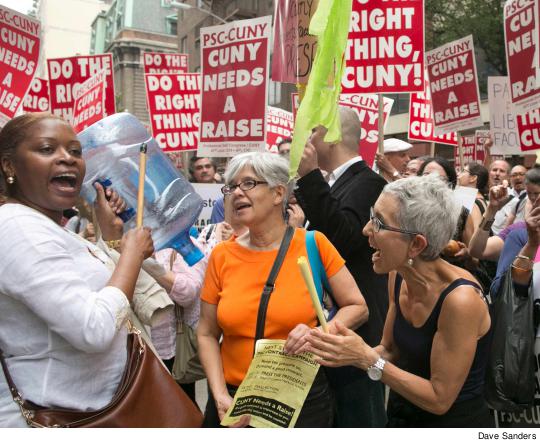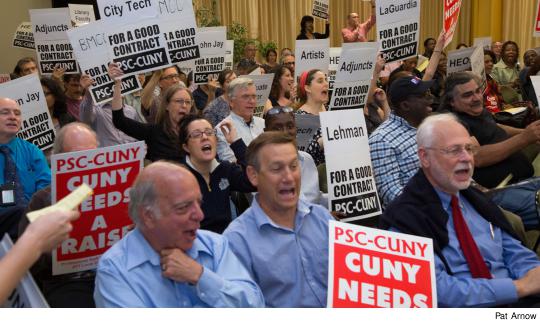Close to 1,000 PSC members demonstrated outside the September 29 meeting of the CUNY Board of Trustees, demanding that management come to the bargaining table with an economic offer.
Suresh Tewani carried a sign saying Chemists For A Good Contract. “CUNY is without a contract for a long time,” said Tewani, an assistant professor at City Tech. “We need a contract, we need a fair contract, we need a raise.”
 |
“I really need a raise because my rent has gone up, my health insurance has gone up,” Kate Walter, a lecturer in developmental skills at BMCC, told Clarion. “I’m actually taking home less money now than I did a year ago because my health insurance went up….It’s time!”
“We are here to make our voices heard,” said Katie Albany, an adjunct who works in the campus Learning Center at City Tech. “By being here together and supporting one another, we want to make the Board of Trustees understand that this is a pressing need for us.”
At the Picket Line
The protest began with picket lines at each of the entrances to Baruch College’s Vertical Campus building, where the trustees were meeting on the top floor. The crowd of union members grew so large that it eventually circled the entire block. “It’s one of the biggest rallies that I have been at for the PSC,” said Paul Washington, a Higher Education Officer and veteran union activist who has worked at Medgar Evers College since 2005.
Abass Abdullahi, an associate professor of biology at Bronx Community College, said he came with a diverse group from his school: “Biology professors, math professors, English professors, a lot of professors from various groups across the campus are here.”
“We have a fabulous turnout,” said Andrea Vásquez, a HEO in the American Social History Project and New Media Lab at the CUNY Graduate Center. “People from every campus and every division and every job title must be here – it’s really remarkable.”
“We’re here because of our commitment to our students, to their academic success,” said Nick Irons, who works in Academic Information Technology in the library at Brooklyn College. “That’s important to us. We all play some part in helping to educate somebody else’s children and to make that happen requires a fair contract for us all. We want a contract that will liberate us to do our best job for all of the students here.”
 |
In addition to salary, issues in this round of contract bargaining include a more balanced teaching load for full-time faculty, job security for experienced adjunct faculty, and a clear path to advancement for CUNY’s HEOs.
While the protest grew outside, more than 100 members filled the audience chairs in the meeting room upstairs where the Board of Trustees had gathered. “The room was full,” City Tech’s Katie Albany told Clarion. “There were people standing on the sides, there were people standing in the back.” CUNY Chancellor J.B. Milliken, who took office in June, went around the room and introduced himself to union members, hearing a bit of what they had to say.
About 10 minutes before the trustees’ meeting began, the union crowd began to chant: “What do we want? Contract! When do we want it? Now!” was followed by “Low pay?…No way!” and others. “It was powerful and energized, and people were really into it,” Albany told Clarion.
A few minutes after Board of Trustees Chair Benno Schmidt called the meeting to order, the chants started up again. “No contract, no peace!” echoed over the sound of Schmidt’s gavel; the chanting continued for a few minutes, then the union members marched out together to join the rally below.
“We need a fair economic offer on the table and we need it now,” PSC President Barbara Bowen emphasized in a letter she delivered to the trustees’ meeting. Recent negotiations “have been productive,” she wrote, “but they cannot progress without money on the table.”
Contract Demands
Union members “understand that our contract is more complex than most because CUNY is funded by both the City and the State, but it is the responsibility of the University administration to deliver a satisfactory economic offer,” said Bowen in her letter to the trustees.
In his report to the September 29 meeting, Chancellor Milliken voiced broad agreement on the need for increased pay. “There is no question that our faculty and staff are entitled to raises, and that this is a high priority for the City University of New York,” he told the trustees.
“The quality of any university is dependent upon the quality of its faculty,” Milliken said, and CUNY must “be competitive…to attract and retain outstanding faculty. This is of course a point made by the PSC this evening, and I think it’s one with which we all agree.” He pledged to “continue to work, in consultation with leadership in the City and the State,” toward that end. Milliken did not indicate, however, how soon management would bring an economic offer to the bargaining table.
Downstairs on the street, union activists told Clarion about the reasons behind the PSC’s contract demands.
“For adjuncts, it’s so important to win job security,” said Blanca Vásquez, an adjunct assistant professor in film and media studies at Hunter and a member of the union’s bargaining team. “Adjuncts are a critical part of the CUNY workforce, CUNY depends on us….It’s just unconscionable that we don’t know year to year if we’re going to be rehired, even though some of us have been coming back for 10, 15, 20 years.”
The teaching load for full-time faculty is a “widely-felt issue across CUNY,” said Lorraine Cohen, professor of sociology at LaGuardia Community College, and is especially acute at the community colleges. “The demands, in terms of publishing as well as teaching load and service, are just overwhelming,” she said. “We really want to be able to serve our students and do the best we can.”
CUNY’s Higher Education Officers need a clear path for advancement “that would recognize the work that HEOs do, because right now there is no way to get a promotion,” said the Graduate Center’s Vásquez. Too many HEOs do excellent work at CUNY for decades without “receiv[ing] the recognition and the financial compensation that they deserve.”
At the Bargaining Table
At a September 19 bargaining session held at the PSC office, HEOs including Maureen Pierce-Anyan, a Higher Education Associate at Queens College, presented the case for the union’s demand. The root of the problem, she told Clarion, is that HEO titles are not defined as a promotional series. “If faculty do an excellent job in their titles, they can get promoted to the next one. But we have to show that our work has changed to the point that it is really a different job.” The only way for HEOs to advance in their career at CUNY is, in effect, to get hired for a new position all over again.
“I think we have to have a mechanism for advancement that includes peer review,” said Pierce-Anyan, who is QC’s director of minority student affairs and pre-professional advisement. This would contribute to more objective and consistent decisions than the current system, she said, and provide HEO-series employees with a clear career path.
There has been substantive discussion of the issue at the bargaining table, and at the end of her presentation, Pierce-Anyan said, “I had the feeling they were listening.” But it remains to be seen, she noted, whether the two sides will reach agreement.
Other issues in the current round of bargaining were reflected in signs that members carried at the September 29 demonstration. Library faculty brought signs calling for parity in annual leave, while those who teach in the CLIP and CUNY Start programs – who are generally in the classroom 30 hours a week – demanded full-time status.
These and other issues are coming up in the union’s “Press the Presidents Week,” October 13-17, with PSC activists urging their college’s president to support action toward a fair contract settlement. “CUNY campus presidents have a responsibility to seek improved pay and conditions for their college’s employees,” said PSC Treasurer Mike Fabricant. “Press the Presidents Week is a campaign of both education and pressure, to get presidents to ‘do the right thing’ by using their influence in support of their faculty and staff.” The week features a range of events, from labor-management meetings to informational picket lines to sending messages by postcard or email.
Member Action
The key October event in the union’s contract campaign comes with a mass action planned for October 21. The local campus events in mid-October and the CUNY-wide mobilization the following week have the same key focus, said Fabricant: “They all give voice to members’ growing impatience with the lack of an economic offer.”
At the September contract protest, PSC President Bowen told the crowd that the union welcomes the chancellor’s remarks to the trustees’ in support of increased pay. “But now we have to hold him to it,” she added, “because it’s one thing to say you’re committed – it’s another to put money on the table.”
______________________________
RELATED COVERAGE:
Oct. 21: PSC March & Rally for a Fair Contract
Union Views: Solidarity for the Contract We Need

